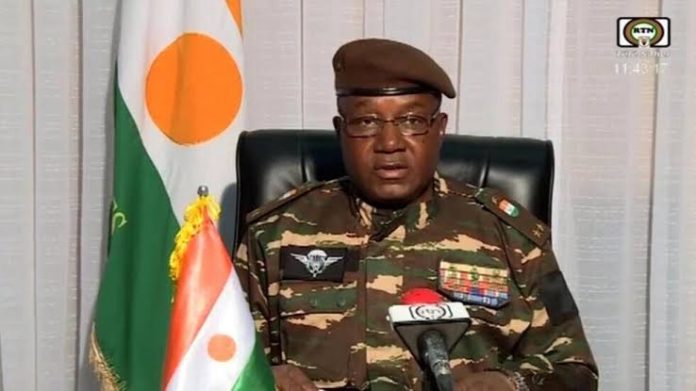Niger’s putschists named an army general as the new leader of the unstable jihadist-hit nation on Friday and warned against any foreign military intervention.
General Abdourahamane Tchiani, head of the Presidential Guard since 2011, appeared on state television saying he was the “president of the National Council for the Safeguard of the Homeland”.
The general presented the coup as a response to “the degradation of the security situation” linked to jihadist bloodshed.
A statement followed from the putschists on TV which warned of “the consequences that will flow from any foreign military intervention”.
“Certain dignitaries .. are in thinking of confrontation” which “will end in nothing but the massacre of the Nigerien population and chaos,” they claimed.
On the third day since President Mohamed Bazoum was detained, former colonial master France demanded the restoration of the democratically elected government saying it “does not recognise” the putschists, and calling Bazoum “sole president”.
The coup has prompted mounting international concern, and on Friday Kenyan President William Ruto called the army takeover “a serious setback” for Africa.
“The aspirations of the people of Niger for constitutional democracy were subverted by an unconstitutional change of government,” he said in a video message.
The European Union threatened to cut aid to Niamey after what it said was a “serious attack on stability and democracy” in Niger.
Bazoum and his family have been confined since Wednesday morning to their residence at the presidential palace located within the Guard’s military camp.
He is said to be in good health and has been able to talk by telephone to other heads of state.
Army backs coup leaders
The Guard’s chiefs who staged the coup on Thursday had won broad army support.
Armed forces chief General Abdou Sidikou Issa swung his weight behind the putschists saying it was “in order to avoid a deadly confrontation”.
The latest target of a coup in Africa’s turbulent Sahel, Bazoum has tried to stand his ground as condemnations swelled from African and international organisations, allies Germany and the United States, as well as France.
French Foreign Minister Catherine Colonna had seemed to hold out hope for the president’s position.
“If you hear me talking about an attempted coup, it’s because we don’t consider things final,” she said. “There is still a way out if those responsible listen to the international community.”
The Economic Community of West African States (ECOWAS) would hold a summit “probably on Sunday”, where “possible sanctions could be decided”, Colonna said.
France, which has 1,500 soldiers in Niger, would support sanctions, she added.
ECOWAS has demanded Bazoum’s “immediate release”, saying he “remains the legitimate and legal President of Niger”.
Pro-coup demonstrations
The landlocked state is one of the world’s poorest. Since gaining independence in 1960, it has seen four coups as well as numerous other attempts — including two previously against Bazoum.
The 63-year-old is one of a dwindling group of elected presidents and pro-Western leaders in the Sahel, where a jihadist insurgency has triggered coups in Mali and Burkina Faso.
Their juntas have forced out French troops, and in Mali the ruling military has woven a close alliance with Russia.
“What happened in Niger is nothing more than the struggle of the people of Niger against colonisers, who tried to impose their own rules of life,” Wagner boss Yevgeny Prigozhin appeared to say Thursday night in a message shared by a Russian body linked to the mercenary group.
The coup plotters had on Thursday urged “the population to remain calm”, after young men ransacked Bazoum’s PNDS party headquarters, setting fire to vehicles.
They had split off from a 1,000 people who had demonstrated in the capital.
Some held Russian flags and chanted anti-French and pro-Moscow slogans.
We want the same thing as in Mali and Burkina Faso,” shouted 19-year-old student Alassane Alhousseini.
We want to take our destiny in our own hands.”
Despite the violence and an army ban on demonstrations, a coalition of parties opposed to Bazoum called for a show of support Friday for the “motivations” of the putschists “while disapproving of all change by force”.
Bazoum took office after elections two years ago, in Niger’s first peaceful transition since independence.
The country of 22 million is two-thirds desert and frequently ranks at the bottom of the UN’s Human Development Index.
It faces two insurgent campaigns: one which swept in from Mali in 2015 and the other involving jihadists from Nigeria.
AFP






